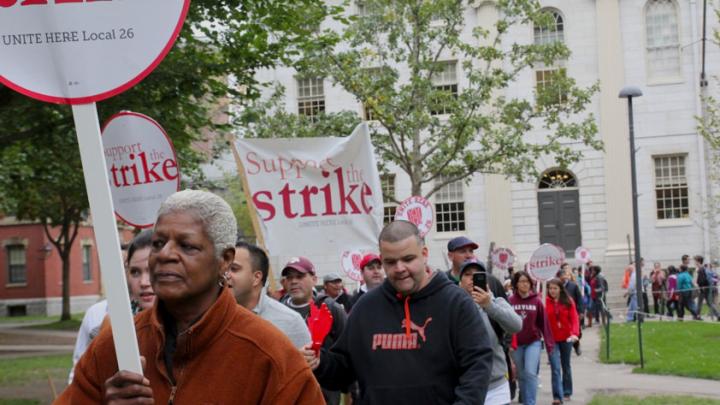Harvard dining workers are celebrating the end of their 22-day strike this week, following a Wednesday vote of 583-1 approving the new contract between the University and UNITE HERE Local 26, the union that represents Harvard University Dining Services (HUDS). The contract agreement was reached in the middle of the night Tuesday, after hundreds of students walked out of class Monday afternoon and occupied the lobby of 124 Mount Auburn Street, where negotiations were taking place. “While the world watched, the lowest paid workers on campus stood up to the richest university in the world. Through a strike of 22 days this group of food service workers led a national conversation that ultimately moved one of the most powerful educational institutions to their side,” Local 26 spokeswoman Tiffany Ten Eyck wrote in a statement on Tuesday. Local 26 president Brian Lang, in announcing the contract to a crowd of workers, said that the union got everything it wanted, “with no concessions to Harvard.” And indeed the union won its basic demands of a $35,000 minimum income for full-time workers and no changes to its health-care plan for the next few years. But the final agreement involves compromises from both sides.
The union’s most significant demand was a minimum income of $35,000 for employees who want to work full-time. Currently, even though wages are $21.89 per hour on average, most HUDS workers earn less than $34,000 per year because they only work seven and a half months of the year. Due to Harvard’s academic calendar, most dining halls are closed during the summer and winter break. Under the new contract, workers will receive summer stipends, so that all full-time employees will be earning at least $35,000 per year. Next summer, employees who work full-time during the academic year will be paid a stipend of $2,400 over 13 weeks, or about $185 per week. By 2020, the stipend will increase to $3,000, or about $231 per week. Part-time workers (who make up about a third of HUDS) will receive prorated stipends based on the number of hours they work. (Just before the strike, Harvard had proposed stipends of $150 per week for workers with five to 20 years of service, and $250 for those who had worked more than 20 years.)
The stipends provide far less income than the $800 per week that full-time dining workers earn during the academic year, but they do help resolve a decades-long tension over year-round work between Harvard and the union. In the past, workers have had difficulty finding temporary employment elsewhere during Harvard’s summer and winter breaks, and are thus forced to manage on an uncertain income. At some other universities, notably at Yale, dining workers belong to the same union as workers in other trades, and thus are able to work year-round. Throughout negotiations, many workers had hoped that a similar arrangement could be made here.
HUDS workers will also receive wage increases of 2.5 percent each year of the five-year contract. Together with the summer stipends, the raises will amount to 16.5 percent over the life of the contract. Harvard had initially proposed wage increases totaling 10 percent for the duration of the contract. The union’s initial proposal had been for raises totaling 40 percent over five years, according to University officials.
About 250 of the 750 members of Local 26 are employed at Harvard’s professional schools through the private contractor Restaurant Associates, and are already eligible for public unemployment insurance during the summer. They won’t be affected by the summer stipends, but they will receive the same wage increases as HUDS workers.
HUDS will also retain the same health plan for the next two years, avoiding the plan that the University had proposed—identical to one it negotiated with the Harvard Union of Clerical and Technical Workers earlier this year. That plan raised copayments substantially: from $40 to $100 for emergency room visits, and from $0 to $100 for hospital inpatient and outpatient services. But the plan also would have reduced workers’ monthly premiums; under the current dining services plan, premiums will increase 7 percent next year.
Beginning in 2019, HUDS will likely move to a health plan with higher copays, but these will be covered by a flexible spending account of $275 for each worker.
In an email to the Harvard community, University executive vice president Katie Lapp wrote, “I am pleased to report that Harvard has reached an agreement in principle with UNITE HERE Local 26, the union that represents Harvard’s dining services workers, on a new, five-year contract that represents a fair and reasonable resolution to negotiations...Throughout this negotiation, the University has sought a resolution that maintains superior compensation for our dining workers, acknowledging their role as integral members of the Harvard community. We also sought an agreement that recognizes the importance of carefully stewarding University finances as we pursue our academic mission in a period of constrained resources.”
Workers were paid $40 per day by the union during the strike. Strikers will not be paid by Harvard for days not worked, but the University will cover the cost of expenses normally deducted from their paychecks, including health insurance, public transit passes, and parking.








